Claudia Cohen Hall 402

Please join us on Novermber 7th, 2025 for our Fall Colloquium with Jada Wiggleton-Little of Ohio State University.
Title: But Hurt Feelings Really Do Hurt
Abstract: Not all unpleasant experiences are created equal. Some mental states are unpleasant, while others hurt. Painfulness, or hurt, is a property that an affective experience can acquire in virtue of the affective experience’s intentional content at a time, t. More specifically, I will argue that painfulness can be characterized as an experience that has as its intentional content, a representation of a perceived existential threat to one’s (social or physical) well-being and a command, “Less of this!,” where ‘this’ refers to both the perceived state of affairs and the painful affect itself. Call this the dual-directional imperativist view about painfulness. A dual-directional imperativist view can explain how experiences like heartbreak, intense disgust, and ‘hurt feelings’ can be painful without themselves being a state of pain. Moreover, Kate Manne (2017) has suggested that a subject’s bodily imperatives can make moral claims on any moral agent. If the source of the bodily imperative is in the painfulness of pain and not the pain sensation, what does this mean we owe ourselves and others when a subject’s feelings has been hurt?

 Department of Philosophy
Department of Philosophy